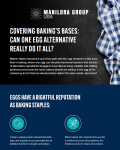Danish green-light gives Preventase the run of EU
authorities for the use of its Preventase, meaning that the
acrylamide-reducing enzyme can now be used in food products
throughout the EU and the US.
At present, enzymes used in food processing do not need to be approved prior to being placed on the market in most of Europe.
Denmark and France, however, are the two exceptions - and DSM received approval from the French in September.
The news is significant because food manufacturers often seek to market the same products in several countries, and having a special case for an ingredient in one country would pose a considerable barrier to business.
Acrylamide is a suspected carcinogen that is formed during by heat-induced reaction between sugar and an amino acid called asparagine.
Known as the Maillard reaction, this process is responsible for the brown colour and tasty flavour of baked, fried and toasted foods.
DSM's solution is an asparaginase enzyme that converts free asparagine into aspartic acid, another animo acid that does not form acrylamide.
The nutritional properties are unaffected, and so are the browning and taste aspects.
It is described as "an established acrylamide mitigation technology… for dough-based products such as bread, biscuits, crackers, formed potato products and crackers".
Despite the fact that the first consumer product containing Preventase is already on the market (Christmas biscuits in Germany), it is not the only company making headlines in the field this year.
Novozyme has also launched its Acrylaway enzyme this year.
Although both Acrylaway and Preventase are asparaginase and claim no effect on other aspects of a product, they are from different production strains.
Novozyme's is from Aspergillus oryzae and DSM's from Aspergillus niger.
The European regulatory situation on food enzymes is set to alter in the next couple of years, since the new FIAP (Food Improvement Agent Package) regulation will, for the first time, set out requirements on their use.
This piece of legislation is still very much under discussion between the European Council and Parlliament, with adoption expected in mid 2008.
Both DSM and Novozymes have obtained GRAS (generally recognised as safe) status for their enzymes in the US.
DSM communicated the FSA's non-objection on Preventase in May, after an article in a Dutch newspaper expressed uncertainty about the safety of the technology.
The spokesperson told FoodNavigator-USA.com at the time that she did not know where the concerns had sprung from.
"We never had any concerns," she said.












